Do You Want A Collegial Future-Looking City Council or
Do You Want A Fractured Council Based Upon Political Ideology
and/or Religious Persuasion?
If you think you might prefer the latter, this article will present for your consideration what city council was like for the six years between 1959 and 1965, and it will consider the political/religious underpinnings of the two Tea Party candidates who present a common slate today, as well as their current counterparts that they seek to dispossess.
Join them with council member Brian Walters and you have a group of three, plus who knows what might result from Ward 2's field of six. As you noticed in the above video, Walters called Windsor Hills Baptist Church (per a video posted on February 9) to ask for help in his re-election campaign, and the help was readily given.
For the purposes of argument, let's assume that all three candidates prevail ... Adrian VanManen defeats incumbent Meg Salyer in Ward 6; Cliff Hearron defeats Patrick Ryan in Ward 8; and Brian Walters defeats his challenger David Greenwell in Ward 5. While not yet a majority of the 8-member council, it would certainly represent remarkable progress of the Tea Party to take over Oklahoma City government, that group's stated goal. It must also be remembered that another election will occur in 2013 and then the mayoral election in 2014.
As you will observe in this article, precedent does exit in Oklahoma City politics for such a major shift in the council's makeup even if that major shift was 180° different than the possibility of what we are looking at today.
Preliminarily, here's a look at the city council breakdown and the holdovers who will be up for re-election in 2013 (or for mayor 2014):
- Ward 1: Gary Marrs' term ends in 2013
- Ward 2: Sam Bowman's term ends in 2011; he is not running for re-election; the inclinations of the 6 who have filed for his post are not yet known
- Ward 3: Larry McAtee's term ends in 2013
- Ward 4: Pete White's term ends in 2013
- Ward 5: Brian Walters' term ends in 2011; opposed by David Greenwell
- Ward 6: Meg Salyer's term ends in 2011; opposed by Adrian VanManen
- Ward 7: Skip Kelly's term ends in 2013
- Ward 8: Patrick Ryan's term ends in 2011; opposed by Clifford Hearron
- Mayor: Mick Cornett's term ends in 2014
Understand that this adventure by the Tea Party and/or Windsor Hills Baptist Church is unlike any city council campaign in Oklahoma City's history. To be sure, slate candidates have been presented earlier in our city's history and we'll look at a couple of them below — but none based upon political party after 1927 (when a new city charter providing for non-partisan elections was adopted) — and none ever have been based upon religion — you won't find a Catholic, Baptist, Methodist, Presbyterian, Jewish, etc., slate being put forward to our city's voters ever before in our city's history.
We don't have to look back too far to find a period that the city council was fractured and unable to effectively act when considerations were not political-party-or-religious-based but were instead based upon "politics as usual." Let's have a look at 1959-1965 to see if we'd want to revert to a city council milieu similar to the one that existed during that time. Some of the principal players in this story are James Norick, William Kessler, Jack Wilkes, and George Shirk, though there were several others. In this time the city was divided into four wards, each having two council members.
Step back in time, if you will, to April 7, 1959, and relive the following history with one one on the past and one eye on the present ...
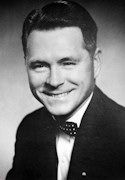 James H. Norick Elected Mayor. On April 7, 1959, James H. Norick was elected mayor (in the same vote which repealed prohibition in Oklahoma). His election didn't come easy. In the March 17, 1959, primary, he polled third: Charles R. Burba, 9,994; Merton Bulla, 9,673; and Norick 9,611. Norick asked for a recount and won it by a single vote against Bulla, 9,571 to Bulla's 9,570. In the general election against Burba, Norick won a resounding victory — Norick 58,648 to Burba's 35,682. James H. Norick Elected Mayor. On April 7, 1959, James H. Norick was elected mayor (in the same vote which repealed prohibition in Oklahoma). His election didn't come easy. In the March 17, 1959, primary, he polled third: Charles R. Burba, 9,994; Merton Bulla, 9,673; and Norick 9,611. Norick asked for a recount and won it by a single vote against Bulla, 9,571 to Bulla's 9,570. In the general election against Burba, Norick won a resounding victory — Norick 58,648 to Burba's 35,682.Despite that resounding victory, just one month later Norick got a taste of what would often mark the remainder of his 4-year term — on June 9, 1959, his nomination of John Boardman to replace J.D. Patterson on the planning board was rejected by the city council by a 7-0 vote. 1961 Council Elections. In spring 1961, council elections would occur. On February 17, a group calling itself "Good Government League of Oklahoma City" entered the city council election campaign by buying radio advertising time for attacks on the city administration. The group was led by Merton Bulla, William C. Kessler, and Walter M. Harrison, they being announced foes of city trusts and most especially the $63,750,000 Atoka water project which would run water in a pipeline from Lake Atoka in southeastern Oklahoma to Lake Stanley Draper, owned by Oklahoma City. In the election, Kessler opposed incumbent John C. Moran in Ward 1. On March 16, 1961, the Oklahoman came out against the league, calling it the "Bad Government League." It claimed that the league was engaging in false advertising, was entirely negative without showing positive alternatives, and without disclosing who was financing the organization. Although 21 people ran for the various council positions, the league appears to have had only one candidate, Ward 1's William C. Kessler. In a runoff, Kessler won the Ward 1 spot. The Good Government League of Oklahoma City doesn't seem to have existed after this election. Kessler was regarded as the standard bearer of anti-administration forces. 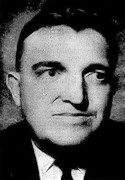 William C. Kessler. One of Kessler's first attempted actions was the ouster of city manager Sheldon L. Sterling. Kessler lost that vote 6-2, Harold L. Johnson, Ward 4, being the only council member to join Kessler. In April and May, 1962, Kessler and Johnson used delaying tactics to prevent a $11.5 million street improvement bond issue to the people for vote. The bond issue failed when voted upon, 55%-45% (60% needed for passage), even though Kessler's Ward 1 voted for its passage 2-1. William C. Kessler. One of Kessler's first attempted actions was the ouster of city manager Sheldon L. Sterling. Kessler lost that vote 6-2, Harold L. Johnson, Ward 4, being the only council member to join Kessler. In April and May, 1962, Kessler and Johnson used delaying tactics to prevent a $11.5 million street improvement bond issue to the people for vote. The bond issue failed when voted upon, 55%-45% (60% needed for passage), even though Kessler's Ward 1 voted for its passage 2-1.During a July 24, 1961, council meeting, also on a proposed bond election, tempers flared again. "A little later in their debate, Martin demanded that Ware stop interrupting. 'Sit down and keep your damned mouth shut,' Martin flared. Martin was in the process of chiding Ware for failure to provide for relocation or improvement of the north side sewage disposal plant." See this July 25, 1961, article for more detail. A House Divided. Matters worsened. In its August 30, 1961, editorial, "A House Divided," the Oklahoman said, Certainly there isn't much reason to suppose the taxpayers are going to embrace any far-reaching bond proposal until the council men themselves are able to agree on what's needed. ¶ But the divided present council's worsening malaise goes much deeper than the manifest differences concerning the scope and cost of the proposed bond issue. Far more disturbing is the possibility that the often unpredictable council majority may be led to act in some instances more out of a spirit of personal vindictiveness than in keeping with the city's best interests. ¶ From the time it became apparent that a new power alignment was forming the city hall has been rocked by firings, rumored firings and recurring departmental shakeups. The end apparently isn't in sight. Councilman William Kessler of Ward 1 says that, 'you haven't seen anything yet.' * * * Thus the Ward 1 councilman makes some rather broad published hints concerning further possible personnel charges. The city charter gives the council and the mayor control over a few enumerated municipal offices and commissions but provides that all other "departments, functions, and boards" shall be under the city manager. Councilmen are enjoined not only from trying to dictate hirings and firings but also from trying to interfere in the work of employees responsible to the city manager. * * * Nevertheless the people aren't entirely without a recourse under the charter. The old charter contained a joker that made recall a practical impossibility. The new charter provides for recall elections when 35 percent of the registered voters in any councilman's ward so petition.The Oklahoman's invitation for a recall election found no traction. But the implications of Kessler's remark, "you haven't seen anything yet," did. Kessler as Defacto Mayor. An October 11, 1961, Oklahoman article reported that, "The split in the city council showed no signs of healing Tuesday as William C. Kessler, Ward 1 councilman, was elected vice-mayor for a six-month term by a vote of 5-2. * * * The vice-mayor, serves as a stand-in for the mayor, serving as the presiding officer in his absence, but there is usually very little campaigning for the job although whoever holds it occasionally has the power of making appointments to city boards and commissions. ¶ Martin, the retiring vice mayor, was complimented by Norick for the manner in which he had presided during the mayor's absences. ¶ Kessler, noting this, suggested, 'I guess you won't be traveling so much now.'" As it developed, Norick should have been paying attention. These were the earliest days of Oklahoma City's Urban Renewal, Oklahoma City having authorized the creation of its Urban Renewal Authority by council vote on June 27, 1961. The 5-member OCURA members were to be appointed by the mayor, with the approval of city council and, so, as a first step, commission members were needed to be appointed by the mayor and approved by council. In June, the mayor said that he would not rush the appointments. About four months later, on October 24, Norick placed his nominees before the city council. At that time, resistance was met, and the matter was delayed for a week. An October 25 Oklahoman article reported that the mayor asked for an opinion from the city counselor's office as to the necessity of city council approval of his nominees, notwithstanding the clear provisions of the city charter that mayoral appointments required city council approval. On November 1, 1961, the Oklahoman reported, Norick's Choice for Authority Blocked Again. The city council Tuesday postponed indefinitely the appointment of an Oklahoma City Urban Renewal Authority after refusing for a second time to consider a list of five names offered by Mayor Norick. * * * The maneuver was blocked by the motion of William C. Kessler, Ward 1, to hold up consideration of the appointments indefinitely. * * * Sage, Aker and Wayne Speegle, Ward 4, voted against the indefinite shelving of appointments. The delaying action gives Kessler, who recently was elected vice-mayor for a six month term, a strong hand in the eventual selections. Kessler will serve in Mayor Norick's absence and could make the appointments anytime the mayor is out of the city, provided, of course, a majority of the councilmen is agreeable.A November 2, 1962, Oklahoman article reported, Speculation that city councilmen will attempt to name an Urban Renewal Authority in the absence of Mayor Norick continued Wednesday in spite of denials by individual council members. The chance to name the five-member board will come up at 9 a.m. Thursday when the council meets in an adjourned session to take up matters pertaining to the Oklahoma City Baseball trust ¶ The denials were issued by several city councilmen after the circulation of a list of names for appointment to the authority. These included James W. Bill Berry, former city attorney; Joe C. Scott, city insurance executive; Rube Martin, retired railroad man and union leader who helped manage the election of Harold Johnson, Ward 4 councilman; F.D. Moon, retired school principal, and Earle M. Simon, former city clerk. * * * Kessler said, however, that he has no plans to submit a list of nominees Thursday. "And, frankly, I'd rather not."However, Kessler's deceit and treachery were revealed on November 3, 1961: The council, taking advantage of Mayor Norick's absence from the city, pushed through appointment of the five members in a move that was forecast shortly after the mayor's departure for Florida as a guest of the Air Force. * * * William C. Kessler, Ward 1, acting mayor, laid out the list of names at the start of the special meeting, which had been called to act on business of the baseball trust. Ray Martin, Ward 2, protested. "I don't think it is proper and right to take advantage of the mayor being out of town and name his man." * * * [Lonnie] Sage [Ward 2] and Wayne Speegle, Ward 4, did not attend Thursday's meeting. They, with Martin, and occasionally aided by Mayor Norick, have feuded with the majority faction on various matters for several months. Citizens continued to be rocked by headlines featuring the shenanigans of Kessler's block at the city council.Sidebar: On January 10, 1962, the Oklahoman reported that city council voted 5-1 to "hazard the political liabilities" of proceedings being recorded by a tape recorder. "The vote was a victory by William C. Kessler, Ward 1, who has been campaigning for recording of council proceedings for some time. ¶ The project has been delayed by objections from some members that the tape recordings might be tampered with by someone engaged in political skulduggery."  This time, under the above headline, the March 21, 1962, Oklahoman article reported on another 5-3 vote, this one concerning a "super trust" to be known as the Oklahoma City Utilities Authority to be established without public vote, that, "The council voting lineup reverted to the familiar 5-3 division which has characterized major actions last year." Apparently, the document establishing the trust had been prepared and signed by the 5-member majority before the council meeting unbeknownst to the mayor and 3-member minority and was sprung on them out of the blue. The article noted that Wayne Speegle, Ward 4, said, "Speegle noted that copies of the 19-page typewritten document distributed to the mayor and councilmen had been signed prior to the meeting by the five majority members." In retrospect, my sense in reading every Oklahoman article that I could find is that during Mayor James Norick's first term (1959-1963) is that, while his heart may have been in the right place, he was a largely ineffectual leader and was not given to public combat with the more aggressive negative leadership provided by William C. Kessler and his three, sometimes four, council cohorts. One will not find a city endeavor boldly spearheaded against opposition by James H. Norick during his first tenure as mayor. In fact, it appears to me that after Kessler's election in 1961 until the elections in March 1963 that Kessler was Oklahoma City's defacto mayor and leader, leaving Norick sitting on the sidelines. Maybe I've missed something important that would cause me to rethink that conclusion, but, as it stands, I've not seen it yet.  Association for Responsible Government. After three years of mayor and council fracture, not to mention the years which preceded the election of James Norick, a new group established itself in 1963, the "Association for Responsible Government," it being announced in the Oklahoman on January 22, 1963. The article said, Association for Responsible Government. After three years of mayor and council fracture, not to mention the years which preceded the election of James Norick, a new group established itself in 1963, the "Association for Responsible Government," it being announced in the Oklahoman on January 22, 1963. The article said, A group of Oklahoma City citizens organized as the "Association for Responsible Government" revealed plans Monday for sponsoring a slate of candidates for city councilmen and mayor in the coming spring elections. Frank Carey, city lumber dealer and president of the newly formed group, said the association will finance and help conduct the campaigns of the candidates selected.Its goal was to obtain a 20,000 members by $1.00 contributions and to use that money to pay expenses in the various campaigns. "Candidates placed on the association's slate will be asked to agree not to accept personal campaign contributions," the article said. Of the group's initial 100 members, leaders of the group were Frank E. Carey, Jr., president; John W. Johnston, executive vice president; Paul Odom, Jr., secretary; John N. Booth, treasurer; and vice presidents James E. Work, Ralph L. Bolen, Murray Cabell, and Lee Sneed, Jr. In a series of numerous advertisements, citizens were invited to join and submit their nominees for consideration. In a February 20, 1963, editorial, the Oklahoman called the movement a "Fresh Breeze." On February 20, the ARG announced its slate of candidates: Mayor – Jack S. Wilkes, president of Oklahoma City University; Ward 1 – F.M. Petree, board chairman of Home Mortgage and Investment Company; Ward 2 – Jerome W. Byrd, aeronautical and structural engineer and head of Byrd Manufacturing; Ward 3 – Frank Love, vice president of Kerr-McGee Oil Industries; and Ward 4 – Joe Dodson, cafeteria owner and operator. James H. Norick ran for re-election. As to him not being included in ARG's slate, in a March 15 ARG advertisement, it said, Because it was clear he wanted to run again, his candidacy was given fair and deliberate consideration by leading citizens from all sections of the city. A careful review of his record, however, showed he had failed to take a strong and courageous stand on any issue of importance to the city during his entire four-year administration. The Association nominating committee therefore concluded this lack of leadership was a major reason for the divided, indecisive council which has failed in repeated attempts to find a solution to the city's financial plight. It was further noted by Association leaders that under our present mayor's administration, the city council ceased to function as the legislative body which our city charter requires. This condition has resulted in damaging the morale of city department heads and dedicated employees who must be assured that their jobs are secure and their services appreciated.A typical hard-hitting ARG ad from the March 16, 1963, Oklahoman is shown below (click the image for a larger view): 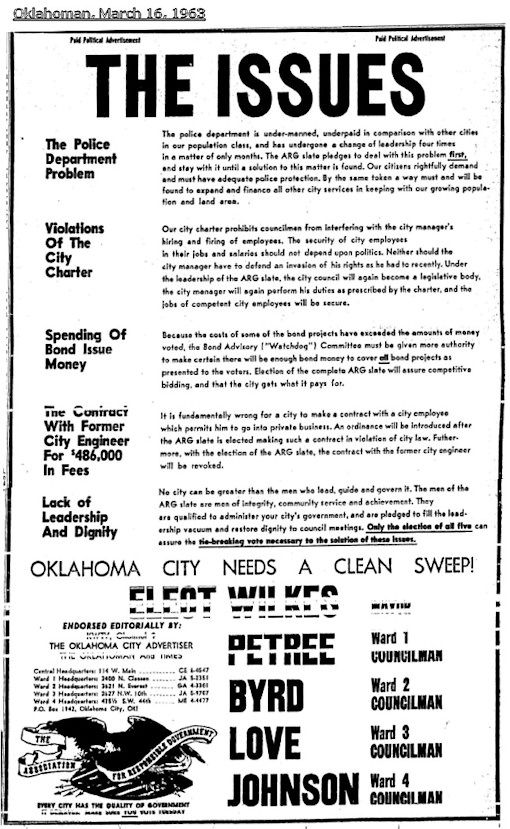 The results of the primary were a smashing 5-0 victory for the ARG. Mayor – Wilkes 33,694, Norick 15,931, Gillespie 1,387; Ward 1 – Petree 12,345, others 3,306; Ward 2 – Byrd 7,636, others 4,384; Ward 3 – Love 7,459, others 3,758. Only in Ward 4 was a general election required: Johnson 5,745, others 5,872 – the 2nd highest vote-getter was Jimmie Birdsong, 1,957, Bill Bishop garnering 1,836. In the general election for Ward 4, the ARG sweep became complete – in light voting, the votes were Johnson 5,914, Birdsong 2,460. But, of course, the four council holdovers were not up for reelection in 1963 — William C. Kessler (Ward 1), William E. Ware (Ward 2), A.A. Aker (Ward 3), and Harold Johnson (Ward 4) were still there. But business would not be quite as usual. The June 1, 1963, Oklahoman, reported that all four, plus, City Manager Robert T. Luttrell, were the subjects of Oklahoma County grand jury proceedings. The article said, All were members of the old majority faction which ruled city hall for two years prior to the clean-sweep victory of the Association for Responsible Government mayor-council slate in April. Luttrell is stepping down as city manager July 1 regardless of any ouster action. * * * The grand jurors listed seven counts against Johnson, six each against Ware and Kessler, and five against Aker.See the article for more specific information. Largely, the charges related to using their positions a council members to influence decisions which belonged to the city manager under Oklahoma City's charter. A June 3, 1963, Oklahoman editorial said, In a prepared statement read to the council last February Luttrell quoted sections of the charter stipulating that city councilmen shouldn't interfere with the manager in the hiring and firing of employees and that councilmen who did that should be subject to removal. He went on to say that in the preceding weeks he had been "subjected to a great deal of pressure to fire some of our most loyal and devoted department heads and other equally fine employees." Luttrell didn't name any names on that occasion but the Oklahoma County grand jury did in its recent report. It said Harold L. Johnson, William C. Kessler and William E. Ware had violated the charger by exerting pressures on the city manager "to remove certain employees which under the charter came within the exclusive control of said city manager."The County (now called District) Attorney filed charges, but through a series of successful legal maneuvers during July-August 1963, the charges were successfully avoided. As to William E. Ware, the city council on its own motion decided to hold a hearing on whether he should be removed from office for misconduct for using his influence to hire men from his district in different municipal departments. See Oklahoman October 16, 1963. However, that hearing never appears to have happened. Whether that result figured into the next part of this story I am uncertain. But, it would certainly not be surprising if it did. 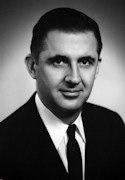 In an unexpected announcement, Wilkes advised that he would leave his mayoral post by May 31, 1964, and become president of Centenary College at Shreveport, Louisiana, thereby leaving ARG and Oklahoma City in the lurch. By that time, Ware was still sitting as a member of the Oklahoma city council. Who would the next mayor be, and how would that be determined? In the absence of the mayor to break ties, the old and tarnished leaders lead by Kessler, and the new ARG leaders, were 4 to 4 in number. The city charter provided that upon a mayoral vacancy the council would select one of its own to become mayor. Unless one or more of the "old" and "new" groups would say, "Uncle," that was not about to happen, the result being that the city would have no mayor for about three years. As a practical matter, and remembering that the mayor only voted to break ties in council member votes, that would mean that from whichever group, old or new, the mayor would come, the result would be that the group, old or new, would be reduced to a block of three while the other group would be a block of four. In an unexpected announcement, Wilkes advised that he would leave his mayoral post by May 31, 1964, and become president of Centenary College at Shreveport, Louisiana, thereby leaving ARG and Oklahoma City in the lurch. By that time, Ware was still sitting as a member of the Oklahoma city council. Who would the next mayor be, and how would that be determined? In the absence of the mayor to break ties, the old and tarnished leaders lead by Kessler, and the new ARG leaders, were 4 to 4 in number. The city charter provided that upon a mayoral vacancy the council would select one of its own to become mayor. Unless one or more of the "old" and "new" groups would say, "Uncle," that was not about to happen, the result being that the city would have no mayor for about three years. As a practical matter, and remembering that the mayor only voted to break ties in council member votes, that would mean that from whichever group, old or new, the mayor would come, the result would be that the group, old or new, would be reduced to a block of three while the other group would be a block of four.The ARG members, led by a motion of F.M. Petree, favored that a new mayor be chosen from outside the council — notwithstanding that the city charter provided otherwise. That possibility was opposed by the "old" group, Kessler facetiously quipping, "That would be fine if they would let me do it." 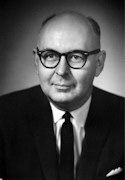 The Compromise — George H. Shirk. At the time, Shirk was not a resident of Oklahoma City, even though he lived in an area already set to be annexed by the city — a quarter mile wide by one-half mile long along the east side of I-35 and north of NE 50th, between Bryant and Vernon Road. Shirk's credentials included being a member of the citizen's group that helped write amendments to the city charter adopted in 1957, a former member of the police commission, president of the Oklahoma Historical Society, and former president of the Greater Oklahoma City Safety Council. The Compromise — George H. Shirk. At the time, Shirk was not a resident of Oklahoma City, even though he lived in an area already set to be annexed by the city — a quarter mile wide by one-half mile long along the east side of I-35 and north of NE 50th, between Bryant and Vernon Road. Shirk's credentials included being a member of the citizen's group that helped write amendments to the city charter adopted in 1957, a former member of the police commission, president of the Oklahoma Historical Society, and former president of the Greater Oklahoma City Safety Council.The appointment of Shirk took a decidedly weird path. First, council member Ware mentioned earlier resigned his council position. Second, the council appointed Shirk to be his replacement. Third, the council named Shirk as mayor. Fourth, Ware was reappointed to his former council seat. So, if the council's charges against Ware weren't earlier resolved, this action by the council certainly provided that closure. Ware was home free. In the end, the 4-4 alignments on council remained the same and Oklahoma City had a new mayor to replace Wilkes. The Last Year of Derision. Neither the 1963 elections nor the 1964 mayoral compromise produced a city council which was marked by the signs of collegiality and respect. That story, the story of a fractured city council, would last until 1965. It is then that the ARG engaged in its last hurrah by electing its slate which replaced all of the old hold-overs, including Kessler, who remained true to himself. As an example, in 1964 the city faced a $5 million deficit for operating expenses (e.g., salaries, police, fire, etc.). As a solution, a majority of the council, excluding Kessler, concurred on putting an earnings tax proposal for one-half of one percent to a vote of the people on October 29. The tax, estimated to produce $4 million annual revenue, was opposed by an opposition group, the "Fair Play Group of Oklahoma County," headed by Kessler. The tax was defeated by a vote of 25,663 favoring to 27,340 opposed, a difference of 1,677 votes. Even if Kessler's position had been diminished, it was clearly not without its effect. As for Kessler personally, he put his 1964 toe into state politics, first the state senate and then the state house. In February, he was roundly defeated in the Democrat primary by Cleeta John Rogers, 59,599 to 28,003. In September as the Democrat nominee for House District 87, he lost in the general election to Republican Georg Camp, 4,746 to 4,098. Left for Kessler as his only political option was the Oklahoma City council race in March 1965. The Association for Responsible Government cranked itself up again — it was dormant between elections — and produced a slate of 4 council candidates but no mayor candidate. Shirk ran for election but he was not included in the ARG slate. The primary vote occurred on March 16 and the general election, where needed, was on April 7. Shirk easily won as mayor; in Ward 1 Kessler was solidly defeated in the primary by ARG candidate H.T. "Hank" Moran (Moran 10,037; Kessler 4,253; S. May 676); in Ward 2 incumbent William E. Ware lost in the primary and in the general election ARG candidate Guy M. James defeated Dr. A.L. Dowell 8,894 to 7,796; in Ward 3 ARG candidate Dr. Harry Deupree defeated Nelson E. Keller 5,043 to 4,267 in the primary; and in Ward 4, Bill H. Bishop defeated ARG candidate Hugh L. Riley 4,986 to 2,316 in the general election. The general result was that 7 of the 8 council members were ARG candidates. Perhaps wanting to have a final word and only a few days before the primary election, it probably surprised no one to see a headline like the one in a March 10, 1965, Oklahoman article below.  Click a link above for the full article. The fracas arose during an exchange between James H. Johnson and Kessler over a southside sewer bond project, which, of course, is much less interesting than the reported dialog: The basis of the Kessler-James H. Johnson clash was James H. Johnson's defense of the ARG-sponsored reforms over the past two years. "The conditions are not as they were when we came down here. There are not four people under indictment by the grand jury. There are not patronage cards being passed about in the City Hall," James H. Johnson asserted.That didn't happen, but instead Kessler found himself without a political office a week later. After the election, the city still needed new revenue to deal with a serious deficit in the cost of city operations. In a unanimous vote, the new council decided to submit a proposal for a 1-penny sales tax to the people as the solution. This time, a united city council and city voted by a 2-1 margin (36,877 to 17,271) to approve the measure. |
Looking back at this history, which part do we like the most — the time that council was divided and accomplished little, or the time in 1965 at long last that council leadership came together and, with the citizens, acted to find a remedy to the problems that existed by doing what needed to be done?
Neither political party nor religion-based factors were in any way involved during the 1959-1965 period of the city's political history. It was just what some would call crappy politics as usual — people who didn't have power doing their best to get it — people who didn't like city employees (or wanting to favor others) doing their best to get them fired or hired — people who had a focus on their own personal agendas and not the city's as a whole.
The MAPS Era. The Association for Responsible Government no longer exits and it didn't in 1993. Coming forward to contemporary times, there has been no need for it to.
After the adoption of the initial Metropolitan Area Projects initiative in 1993, the city council and mayor have been collegial, civil, and have walked hand-in-hand with the citizens, with few exceptions. To be sure, that doesn't mean that differences have not existed, and they have. But, by and large, council members have worked together for the city's common good, and their common vision for the progress of the city in its role of improving the livability of the city — good for citizens, good for attracting business, good for attracting visitors.
That represents a 17+ year period of time. During that time, we have witnessed (1) the widening and beautification of the Oklahoma River and its becoming an Olympic and world-class rowing and kayaking venue; (2) biking and walking trails around the river and other places in the city; (3) the AAA Bricktown Ballpark; (4) the Civic Center Music Hall becoming a 1st class venue for music, dance, and plays; (5) a beautiful and excellent downtown library and learning center; (6) a major league NBA arena and team; (7) a canal flowing through Bricktown for a relaxing change of pace. (8) We have also seen the defunct Skirvin Hotel getting new life breathed into it on its deathbed to become the ever-so-magnificent Skirvin Hilton Hotel. At a more basic level, (9) 1998's MAPS 2 infused $512 million into the city's public schools, and a (10) 2007 bond election is pumping another $500 million into city streets.
On top of that, MAPS 3 promises to (11) create a gorgeous downtown park; (12) establish a downtown streetcar system as the beginning point for other Oklahoma City rail which will hopefully develop in the future; (13) make improvements on the Oklahoma River to solidify its position in the US and the world for its rowing and kayaking venues; (14) create a recreational and competitive fast water venue near the Oklahoma River; (15) make improvements at the state fairgrounds; (16) create senior citizen wellness centers; (17) complete citizen walking and biking trails and sidewalks; and (18) build a new convention center ... if I've not left anything out. With the relocation of I-40 through downtown, a beautiful boulevard is set to replace it through downtown.
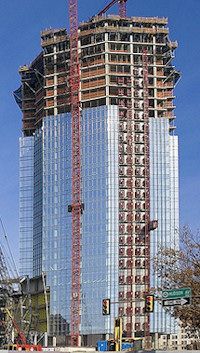 And who amongst us is not bursting with pride over the decision of Devon Energy Corporation to build its world headquarters in downtown Oklahoma City, it being the 50-story Devon Energy Center which is rising toward the sky as we speak?
And who amongst us is not bursting with pride over the decision of Devon Energy Corporation to build its world headquarters in downtown Oklahoma City, it being the 50-story Devon Energy Center which is rising toward the sky as we speak? The relevance to this discussion is that Larry Nichols, Executive Chairman and co-founder of Devon, has said publicly that, were it not for the accomplishments of MAPS 1 in improving quality of life here and its attendant spin-off effects upon private investment downtown, most likely Devon Energy would not have remained in Oklahoma City where it is firmly planted today but would instead have moved to Houston.
If people cannot see beyond the end of their noses to appreciate, and value, city leaders who have demonstrated vision and inspired citizens, individual or corporate, to invest in their home town and improve more than police, fire, streets, city code enforcement, well, with respect I submit that they are badly in need of eye replacements at the least and that they have no business running for or being being mayors or members of city council — not of MY city — and not of YOURS.
How Do These Developments Over 17 Years Time Resonate With the People? The city has maintained for some time that it has a very high approval of the public. That's all good ... but how about something independent to reflect upon public approval.
The Oklahoma Gazette conducted a scientific poll in January 2011, with a margin of error stated to be ± 5.26 percent. The results ...
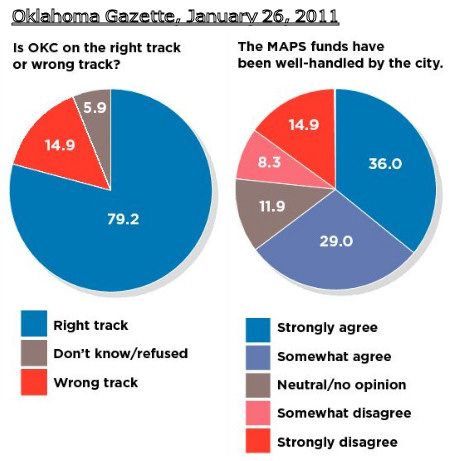
Unless the Tea Partiers want to challenge that poll, they would reasonably conclude that citizens are pleased with our city leadership and most especially with the direction that the city is going.
Think about it — how much different would it be today were we to replace a city council which finds great favor with the city with new elements of party-based, or worse, religion-based, sources of rancor in which many don't share the values of the Tea Party candidates. Were such people have been in power during the past 17+ years, it is fair to wonder,
- MAPS 1 Generally: Would the vision embodied in the original maps ever have been advanced in the first place?
- MAPS 1 Leadership: If you think that such a vision might have been advanced, which of the Tea Party sponsored candidates, VanManen, Hearron, or Walters, would have taken the role of making that happen?
- MAPS 1 Projects Particularly: If you think that one, some, or all of such candidates would have taken such a role, which of the projects described above, #s 1-7, would they likely have NOT supported?
- The Skirvin: Can you even begin to imagine that candidates VanManen, Hearron, or Walters would have supported the action of 3 mayoral administrations to accomplish the rebirth of the dead Skirvin to becoming the Skirvin Hilton that it did?
- As To The City Having an NBA team: Can you begin to think that (a) the city could have gotten one without the MAPS 1 arena being built and (b) the city would have taken the aggressive leadership provide by Mayor Cornett in 2007 to insure the arena's improvement and the establishment of a team's practice facility? And which of these guys do you think would have traveled to New York even before the Hornets were here to meet with NBA Commissioner David Stern, when the seeds were planted with him for the possibilities of Oklahoma City being the host of a major league team?
- As To MAPS 3: Which of candidates VanManen, Hearron, or Walters, would have advocated the MAPS 3 items above, #11-#18, as the next step in the process of continuing a progressive vision for our city and our children and grandchildren? I triple-dog-dare you — name just one of them who would. Walters was the only council member to oppose MAPS 3. In their respective interviews with Gwin Faulconer Lippert on January 28, candidates VanManen and Hearron gave at least a glimpse into their minds. Said VanManen: "I would rather spend money like I've said for police and fire protection and for streets and roads than I would for what's taking place in city center. I just think that our priorities are misplaced," and, about downtown streetcars, "Well, the thing that I, uh, the response that is have to that is, you're spending $125 or so million dollars on a fixed mile fixed track and people will still have to get in their cars to drive down there to be able to appreciate and to ride on it. I just think that it's misplaced, very much so." In the same interviews, Cliff Hearron said, "Well, first of all, my voters in Ward 8 don't want it. They didn't want it. I voted against it. The vote was 54 to 46 or thereabout, it was about half and half." Actually, Hearron's Ward 8 voted in favor of MAPS 3 by a vote of 8,628 (66%) Yes to 4,469 (34%) No, in unofficial returns. He also said, "What I would think we should do with it now that we have it is re-evaluate it over the next year – because I really believe we are going to change the complexion of the council quite a bit ..."
- As To Public Availability To Inquire. Oklahoman reporter and friend of mine Steve Lackmeyer inquired whether these two candidates were ducking the voters in his OkcCentral blog. As had been reported in a February 19 Oklahoman article by Michael Baker, all 13 candidates for city council had been invited to participate in a forum hosted by Chesapeake Energy on Friday, February 18. While Brian Walters of Ward 5 found it possible to attend (and I give him props for that – he is at least one if not more cuts above his allies for doing so), neither Tea Partier VanManon, Ward 6, nor Hearron, Ward 8, showed up to say what they were about or answer questions from those in attendance. This was not the first time that VanManon and Hearron declined public scrutiny. In a February 9 article by Clifton Adcock, the Oklahoma Gazette article reads, in part:
Hearron and Van Manen, who both attend Windsor Hills Baptist Church and work at the church’s Oklahoma Baptist College, scheduled interviews with the Gazette. However, after learning that Windsor Hills pastor Tom Vineyard had been interviewed by the Gazette for a separate story about the pastor’s call for Police Chief Bill Citty’s resignation following Citty’s comments on gun control, Hearron canceled the interview.
When contacted about the cancellation, Hearron said he was offended the Gazette asked Vineyard if Citty’s comments had been one of the reasons Hearron and Van Manen decided to run for council. Van Manen did not return a subsequent phone message.
I submit to you that the election of the Tea Party nominees would return our city to the fractured times of 1959-1965. The only saving grace would be that the Tea Partiers would be powerless to undo the good which has already occurred. As to the future after their ascendancy to power, it would not then be too late to resurrect a symbol and organization from the fractured period, should that be needed ...
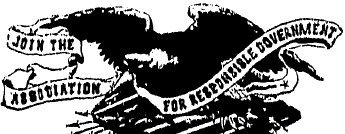
Many if not most Oklahoma Citians are proud of what has happened here during the past 17+ years. We are not so myopic or simple-minded as to be only concerned about police, fire, roads, or code enforcement, as important as such basic items are. Well beyond that, we value the importance of civic vision, instilled in us principally by Mayor Ron Norick, of what our city can be if we choose for it to be so. As well,we are inheritors of the vision of Neal Horton who had faith in his baby, Bricktown, that he never got to see even as it emerged like a Phoenix after his death.
For those of us who like the city's direction, and if the Gazette's poll is correct that is about 79% of Oklahoma City citizens, that can mean only these things:
- In Ward 8: Vote for incumbent Patrick Ryan and defeat Cliff Hearron, Hearron falsely saying that his Ward disfavored MAPS 3 when, in fact, his Ward supported MAPS 3 by a vote of 8,628 Yes to 4,469 No (unofficial returns).
- In Ward 6: Vote for incumbent Meg Salyer and defeat Adrian VanManen.
- In Ward 5: Vote for challenger David Greenwell who says that he is committed to "making certain the voters get everything that was promised [in MAPS 3], and defeat incumbent Brian Walters who voted against MAPS 3 even being submitted to a vote of the people in the first place.
- Don't Vote and Let Others Make Your Choice For You. That is the suggestion of Sooner Tea Party leader Al Gerhart. In his January 2011 newsletter, he said,
We have two Tea Party candidates for OKC City Council, Cliff Hearron for Ward 8 and Adrian Van Manen for Ward 6.
Cliff is a retired military officer, an avid Tea Party member, and wants to put the brakes on out of control spending and taxes at the city level. Cliff believes that the core purposes of the city are being neglected while millions are spent developing downtown that profit a few wealthy property developers. Police and fire assets have withered, and our roads have suffered while perfectly good downtown roads were ripped up. Privatization of some city services and stopping Agenda 21 here in the city are two of Cliff’s issues he will be championing.
Adrian is a long time Sooner Tea Party Meetup goup member. The Meetup group is the hard charging group of activists that are the core of the Sooner Tea Party. Adrian has been known to bring a dozen friends from his church, Windsor Hills Baptist Church, to the precinct walks. Both he and Cliff are strong supporters of our Constitution and want to see Oklahoma City draw down social and welfare costs so the city can focus on what government is supposed to do.
The OKC City Council is composed of 8 members. Only one, Brian Walters, is conservative. These races are very low turnout; literally a couple thousand voters will choose who gets the seat, so we stand an excellent chance of winning these two seats if we put money and effort into the races.
Tuesday, March 1 - Get Off Your Tush & Vote
A Council Divided














3 comments:
The church's tax free status should be revoked Continue to fight the good fight.
Ward 2, it appears to me, is turning into a two-man race: Ed Shahid and Charlie Swinton. Shahid ran for Congress in '10 as an Independent because he couldn't get on the ballot as a Green, so I think we're safe in assuming he is not keen on what's being represented by those Windsor guys as the Tea Party Agenda. I met Swinton last month; he's a bank exec (BancFirst) who hews pretty much to the middle of the road, though he's expressed some sympathy for Pete White's streetcars-vs-buses plight, albeit mostly because none of the proposed lines approach Ward 2.
Chaz,
Thanks for the insight about Ward 2. Interestingly, although I live in Ward 6, as I was driving toward the Homeland at 18th & Classen today I noticed a yard sign for Swinton ... "Hey, what's that doing here? Am I confused about which Ward that I live in?" I wondered. I plan to look more closely at the small amount of information reported in the Oklahoman article describing the Friday Chesapeake forum, as well as any Ward 2 candidates' websites that I can find ... but, at first blush, it does not appear that Ward 2 candidates pose a challenge to MAPS 3 progressing as was promised in the election. That's a preliminary comment, though.
Post a Comment